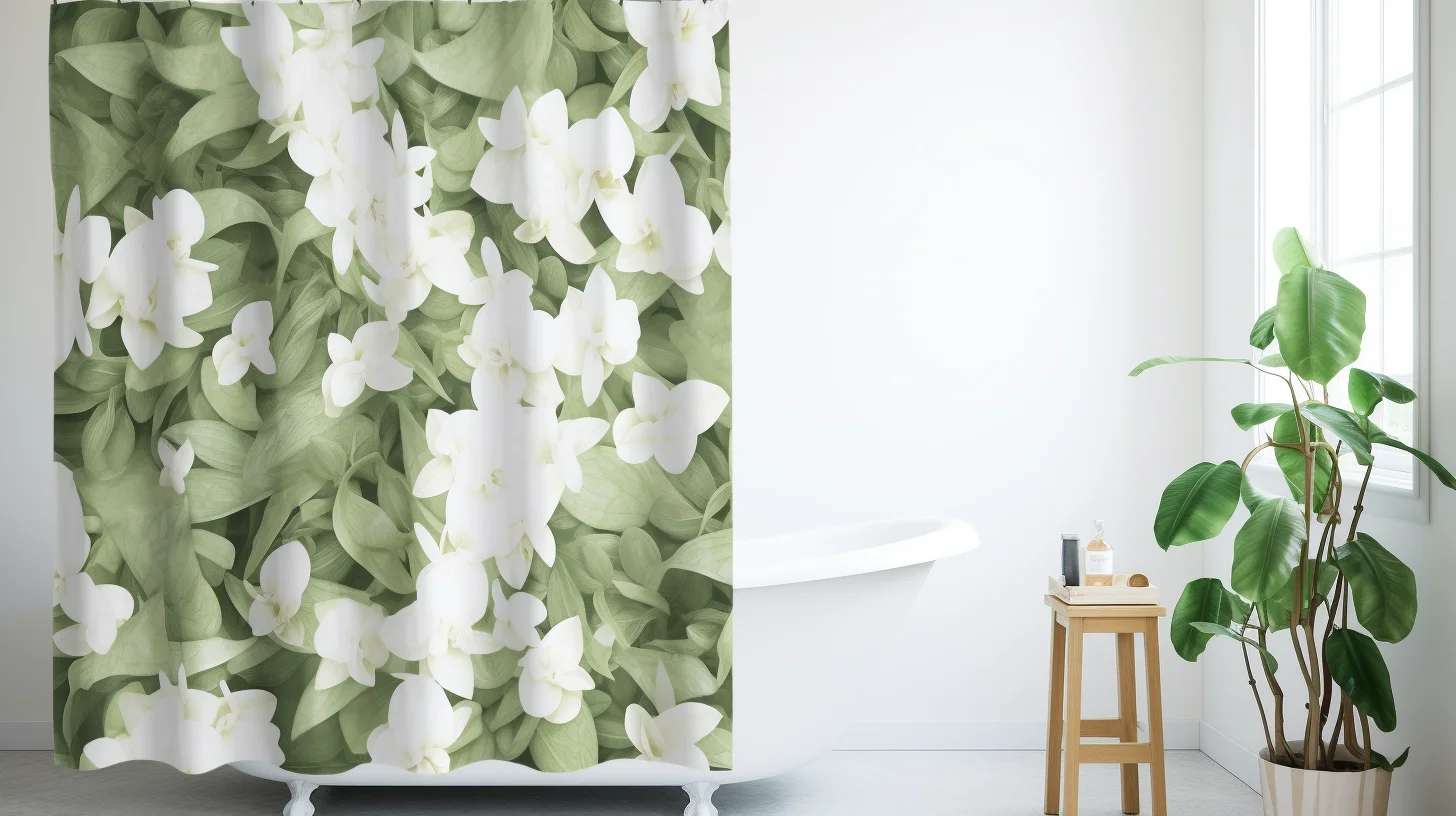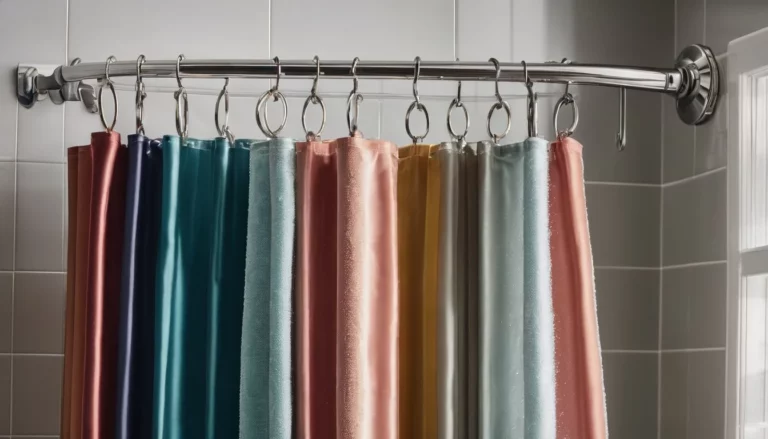Are Plastic Shower Curtains Bad for You?Unveiling the Hidden Dangers and 2 Health Risks
Have you ever considered what your shower curtain is made of and if it could be harmful to your health?
Plastic shower curtains are a common sight in most homes. But are plastic shower curtains bad for you? They may be releasing chemicals that you breathe in during your daily routine. There are concerns about the substances used in the production of PVC curtains, including phthalates, which have been linked to various health issues.
It’s essential to educate yourself on the risks associated with plastic shower curtains and weigh them against the convenience they provide. This could be an opportunity to investigate a topic that could affect you more than you think and determine if it’s time to make a change in your bathroom.
Table of Contents
Are Plastic Shower Curtains Bad for You? Key Takeaways
- PVC shower curtains emit harmful chemicals like vinyl chloride and phthalates. This can affect organ function and pose health risks.
- PEVA shower curtains are a safer alternative to PVC. But there are still concerns about the release of volatile organic compounds (VOCs).
- Organic fabrics like cotton, linen, or hemp offer a non-toxic and environmentally friendly option for shower curtains.
- Plastic shower curtains, especially PVC ones, contribute to plastic waste, marine pollution, and the accumulation of microplastics in waterways and oceans.
Understanding Plastic Shower Curtains
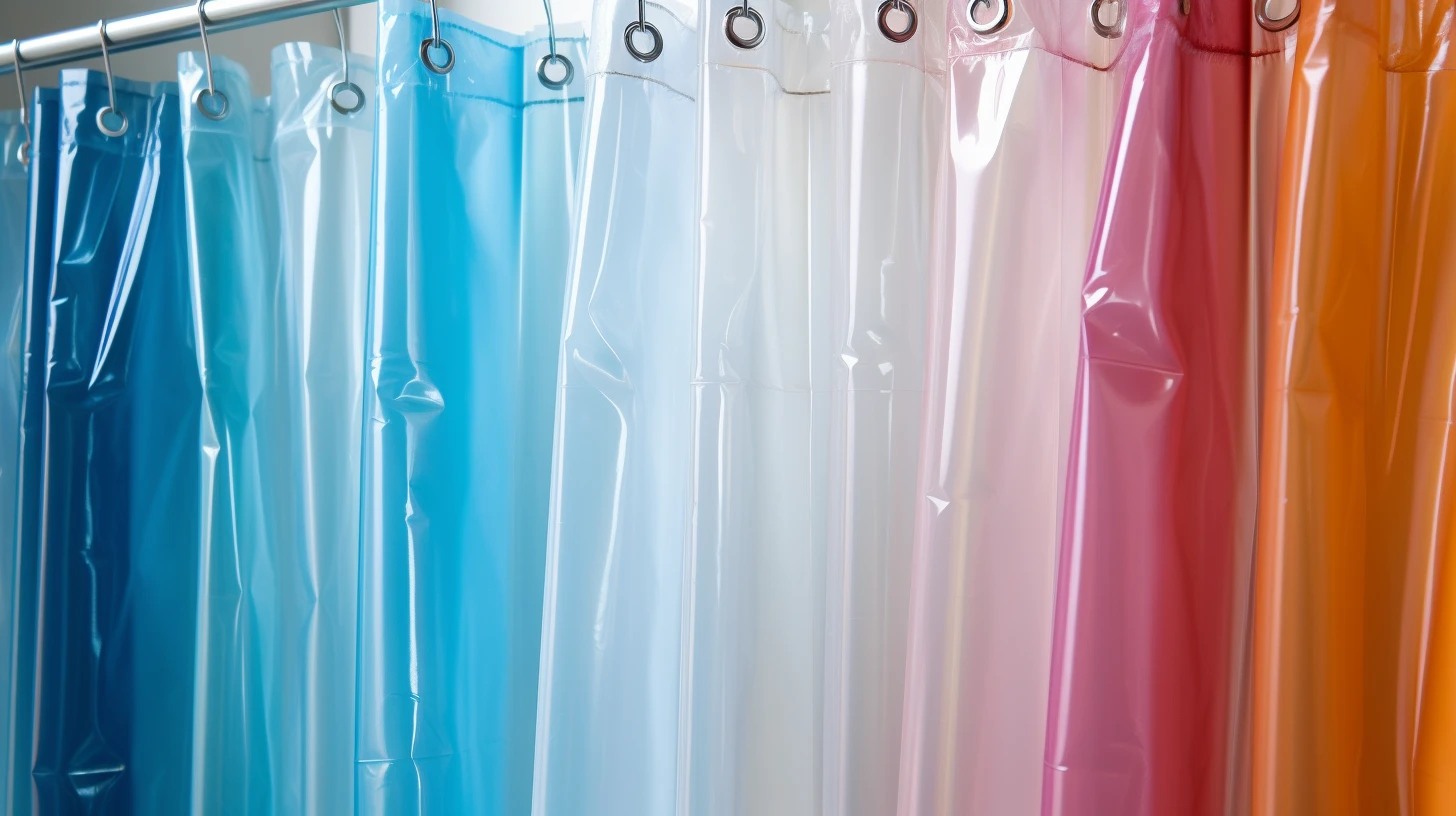
You might wonder what your shower curtain is made of and whether it’s safe for your health.
Common plastics, such as PVC and PEVA, are widely used in shower curtains. But they come with a cocktail of chemicals.
Understanding these materials and their potential risks can help you make a safer choice for your bathroom.
Chemical composition of plastic shower curtains
Understanding the chemical composition of plastic shower curtains is crucial, as many contain PVC. It’s a substance that releases volatile organic compounds (VOCs) and other toxins into your bathroom environment. These toxic chemicals can pose significant health risks, including respiratory issues and damage to your liver, kidneys, and central nervous system. PVC is notorious for containing vinyl chloride, a carcinogen, and phthalates, which can affect organ function.
Common types of plastic used in shower curtains
When selecting a shower curtain, it’s important to know that the most common plastics used include PVC, PEVA, and various sustainable fabric options.
PVC shower curtains, made of polyvinyl chloride, are well-known for their durability. But, they have raised health concerns due to the emission of volatile organic compounds and other toxic substances. These curtains can release harmful chemicals, such as vinyl chloride, into your home environment.
On the other hand, PEVA shower curtains, are often marketed as a safer alternative. They don’t contain vinyl chloride. However, there are still concerns about VOCs with PEVA.
What are the Potential Health Risks of Plastic Shower Curtains?
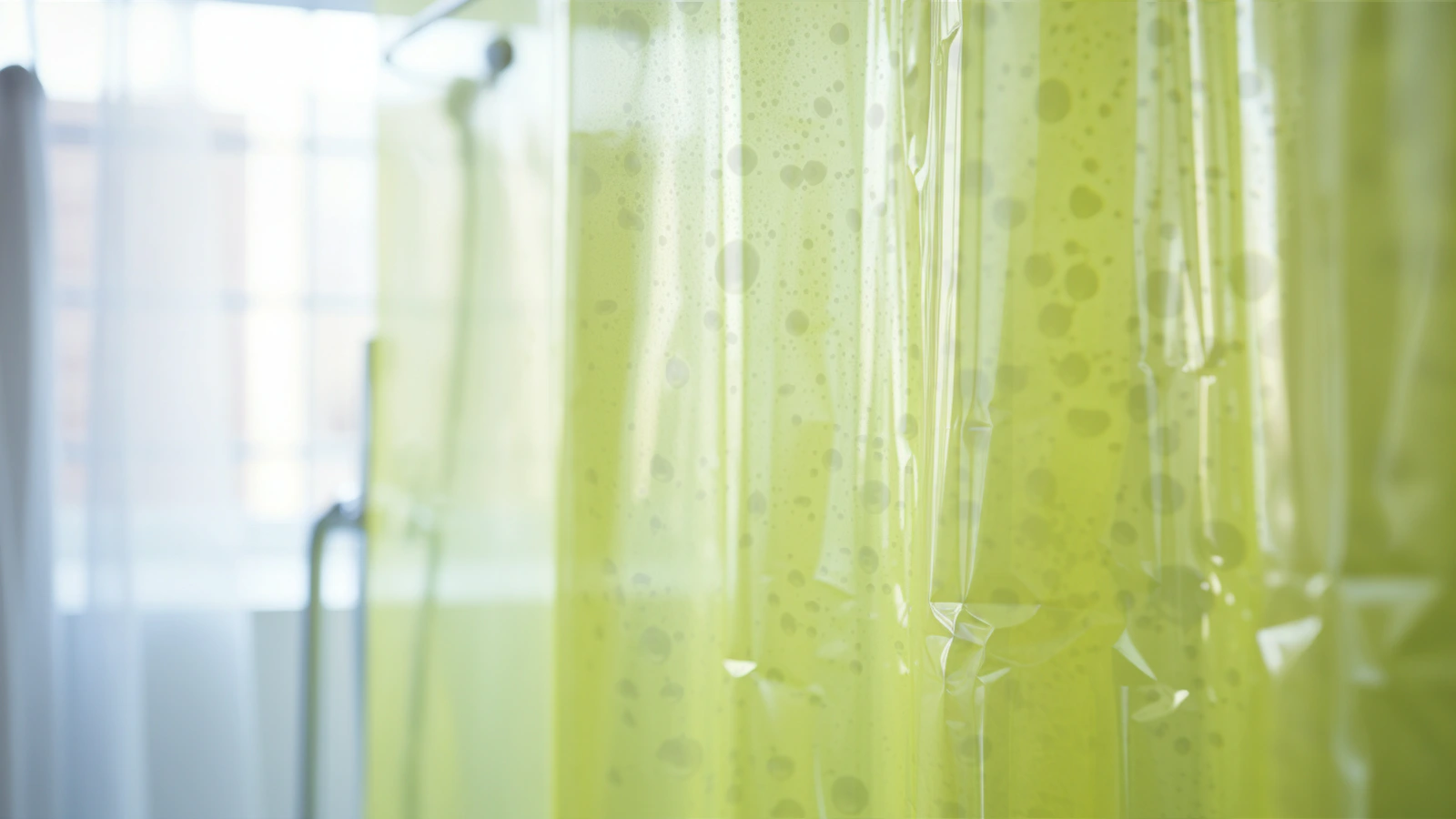
You mightn’t realize it. But your plastic shower curtain could be releasing harmful chemicals into your bathroom. Exposure to VOCs and other toxins from these curtains can pose serious health risks, including respiratory issues and skin irritation.
Additionally, the damp environment of a bathroom can lead to mold and mildew growth on the curtains.
Volatile organic compounds (VOCs)
Plastic shower curtains’ emission of VOCs can pose serious health risks. They include respiratory issues and central nervous system damage. You’re likely familiar with the distinctive smell of a new shower curtain. This is a result of VOCs being off-gassed into your bathroom, deteriorating the indoor air quality. Polyvinyl chloride (PVC) plastic, a common material for these curtains, releases numerous hazardous chemicals.
Mold and mildew growth
Mold and mildew thriving on shower curtains not only mar the cleanliness of your bathroom but also pose significant health risks. These organisms thrive in a damp environment. They can release spores that may be toxic to your health. Here’s what you should watch out for:
- Respiratory Issues: Inhaling mold spores can cause coughing, wheezing, and other respiratory complaints.
- Allergic Reactions: Mold and mildew can trigger allergies. They may cause symptoms like sneezing, itching, and watery eyes.
- Toxic Effects: Some molds produce mycotoxins that can be harmful when absorbed into your body through the air.
What are the Environmental Impacts of Plastic Shower Curtains?
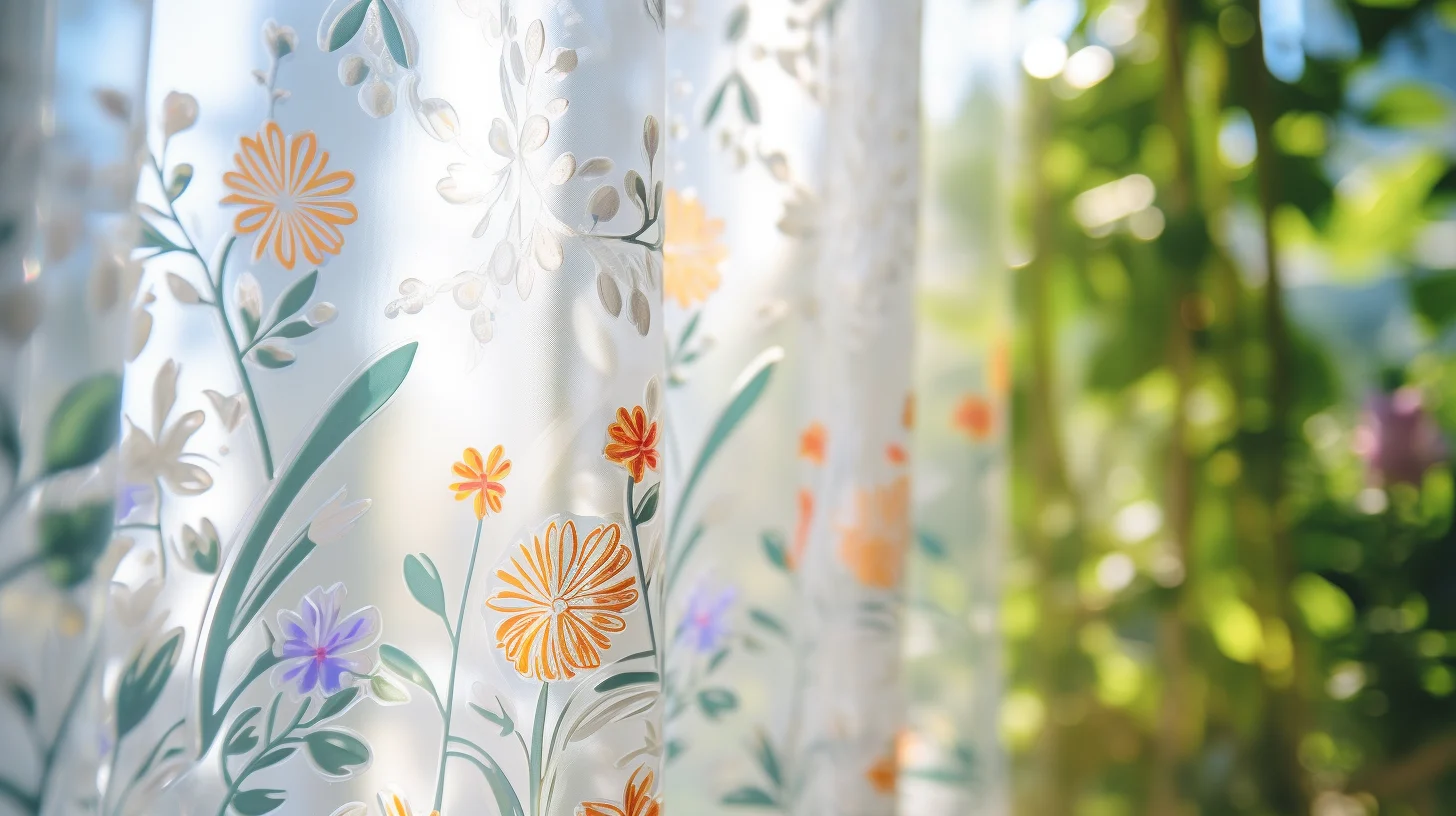
You’ve learned about the health risks. But now it’s crucial to consider the environmental toll of plastic shower curtains.
Plastic waste
Plastic shower curtains, particularly those made from PVC, contribute significantly to environmental pollution. They aren’t easily recyclable. They can release toxic chemicals into ecosystems when disposed of improperly.
Non-recyclable
PVC is notorious for its difficulty in recycling due to the presence of harmful additives like phthalates. These compounds not only pose a risk during use—exposure to VOCs includes respiratory and reproductive issues—but also after disposal.
Marine pollution
Beyond their impact on human health, PVC shower curtains also contribute to marine pollution. They often end up in oceans, where they degrade into harmful microplastics.
When you discard these polyvinyl chloride (PVC) products, they don’t just disappear. Instead, they break down slowly and release VOCs and other toxins into the environment.
As marine life ingests these particles, the entire ecosystem is affected. This will cause a ripple effect of harm that extends up the food chain.
Alternatives to Plastic Shower Curtains
You’re likely seeking healthier options after learning about the risks associated with PVC shower curtains. These alternatives not only protect your health but also contribute to a greener planet.
PEVA or EVA shower curtains
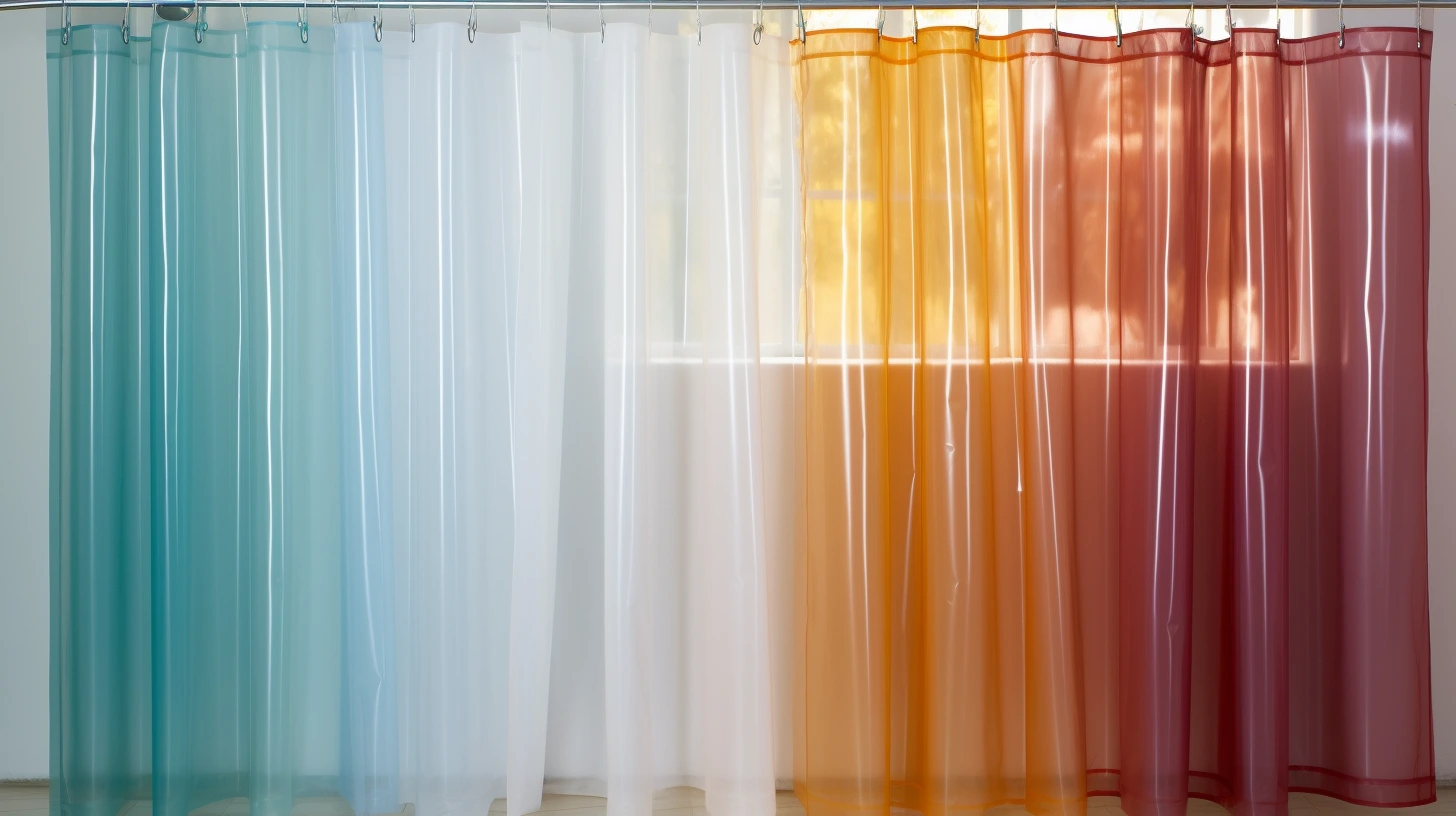
PEVA and EVA shower curtains offer a safer and more environmentally friendly alternative. Unlike PVC shower curtains, these materials don’t contain harmful vinyl chloride or phthalates. This means you’re reducing your exposure to toxic substances.
Here are some key points to consider:
- PEVA and EVA are less volatile: They don’t release as many VOCs compared to PVC options.
- Safer for your household: Without the harsh chemicals, there’s less concern for respiratory or central nervous system issues.
- Environmentally conscious choice: By choosing these materials, you opting for a product that’s less damaging to the environment.
Polyester shower curtains
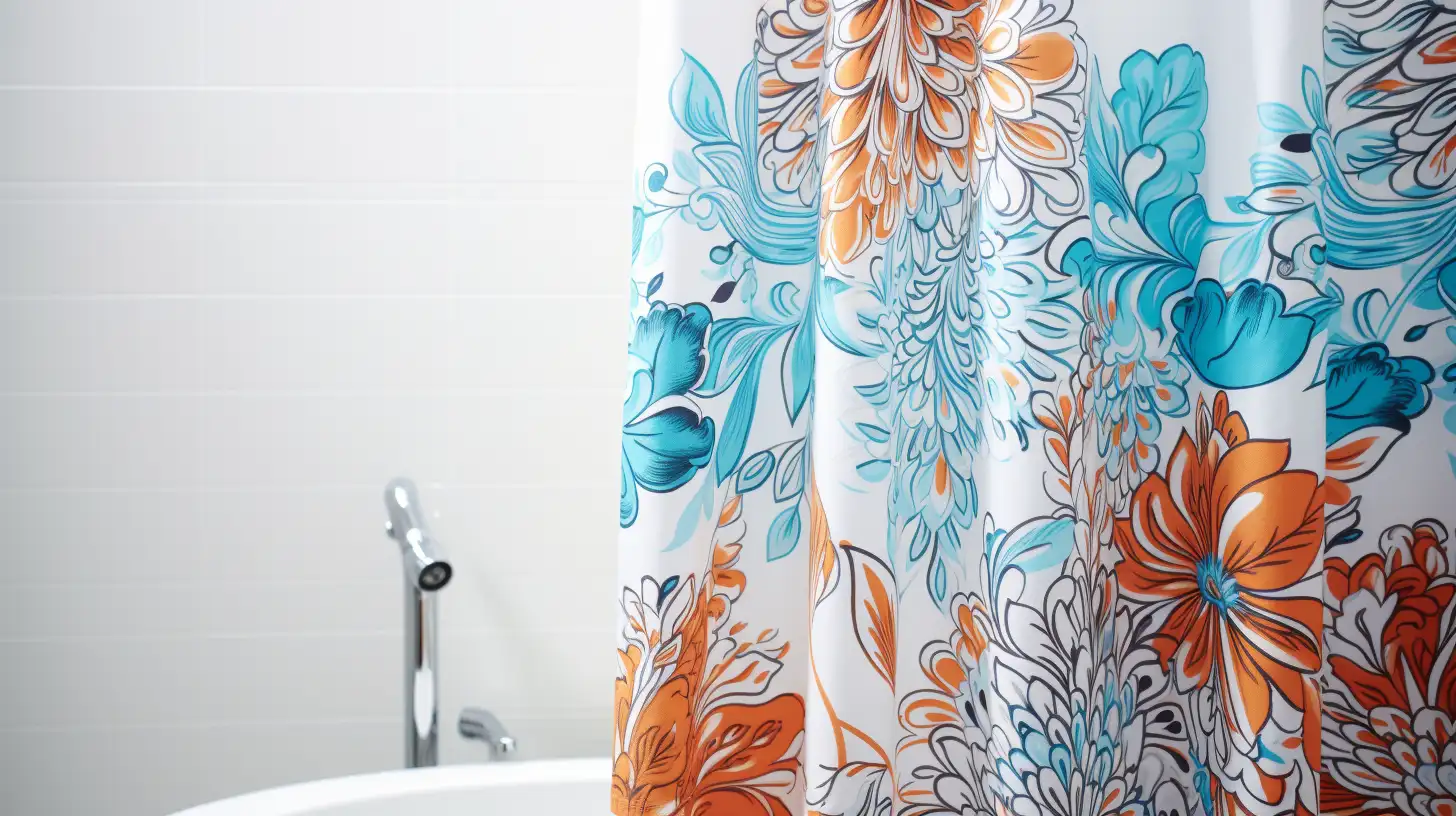
Polyester shower curtains offer a durable and water-resistant alternative to plastic. Additionally, those made from recycled materials can further reduce your environmental footprint. Polyester options don’t off-gas VOCs that can harm your central nervous system. When you’re looking for a new shower curtain, consider the following benefits of polyester:
- Recycled Content: Polyester curtains made from recycled materials support sustainability.
- Low VOC Emissions: They don’t emit harmful VOCs, ensuring better indoor air quality.
- Durability: Polyester is resilient and tends to have a longer life span, reducing the need for frequent replacements.
Bamboo shower curtains
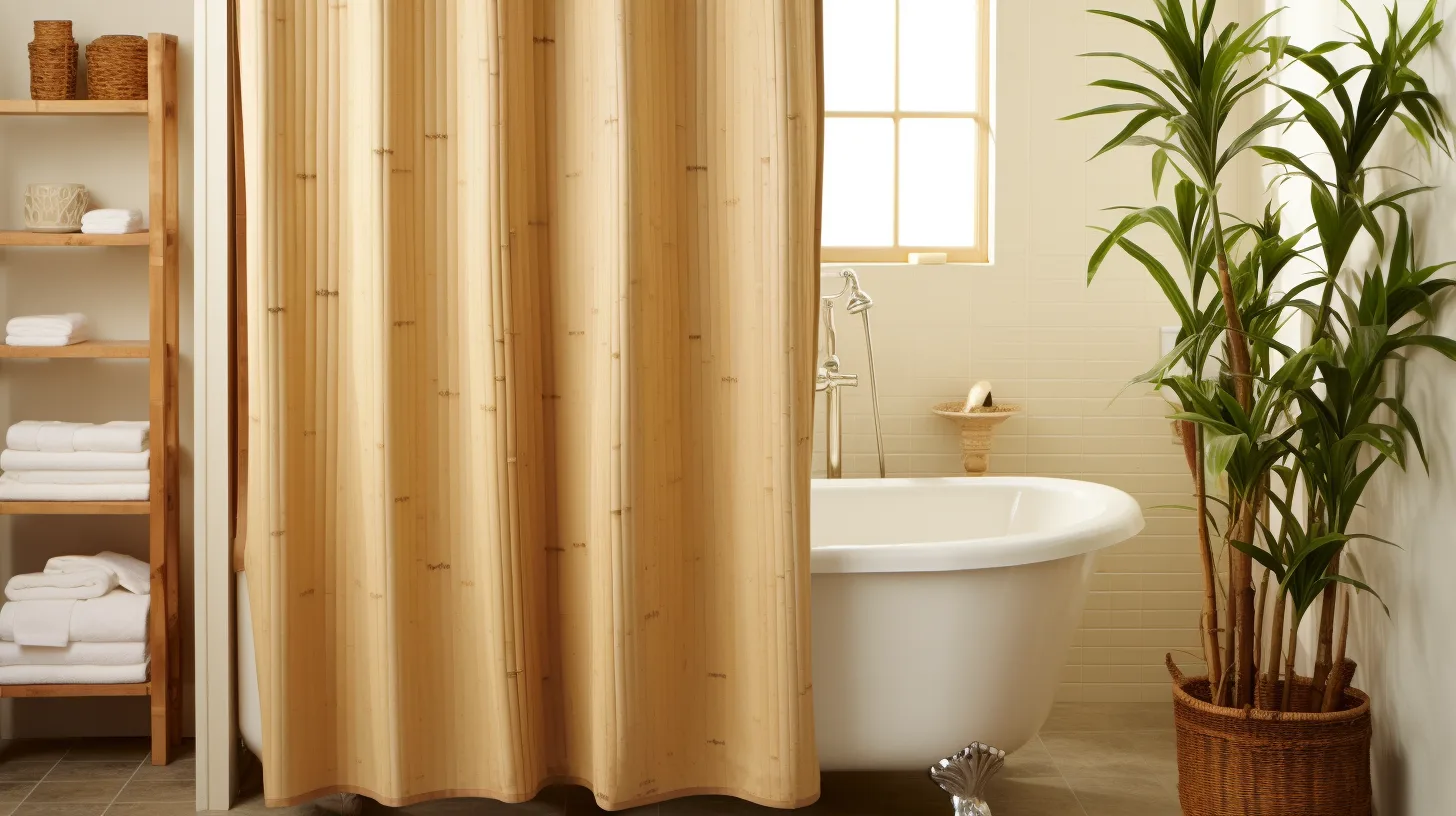
Bamboo shower curtains offer you a safe and eco-friendly choice. They step away from the potentially harmful effects of PVC without sacrificing functionality or style.
Bamboo fibers provide a non-toxic alternative that’s both durable and sustainable. These curtains and shower curtain liners don’t release VOCs, improving indoor air quality.
Hemp shower curtains
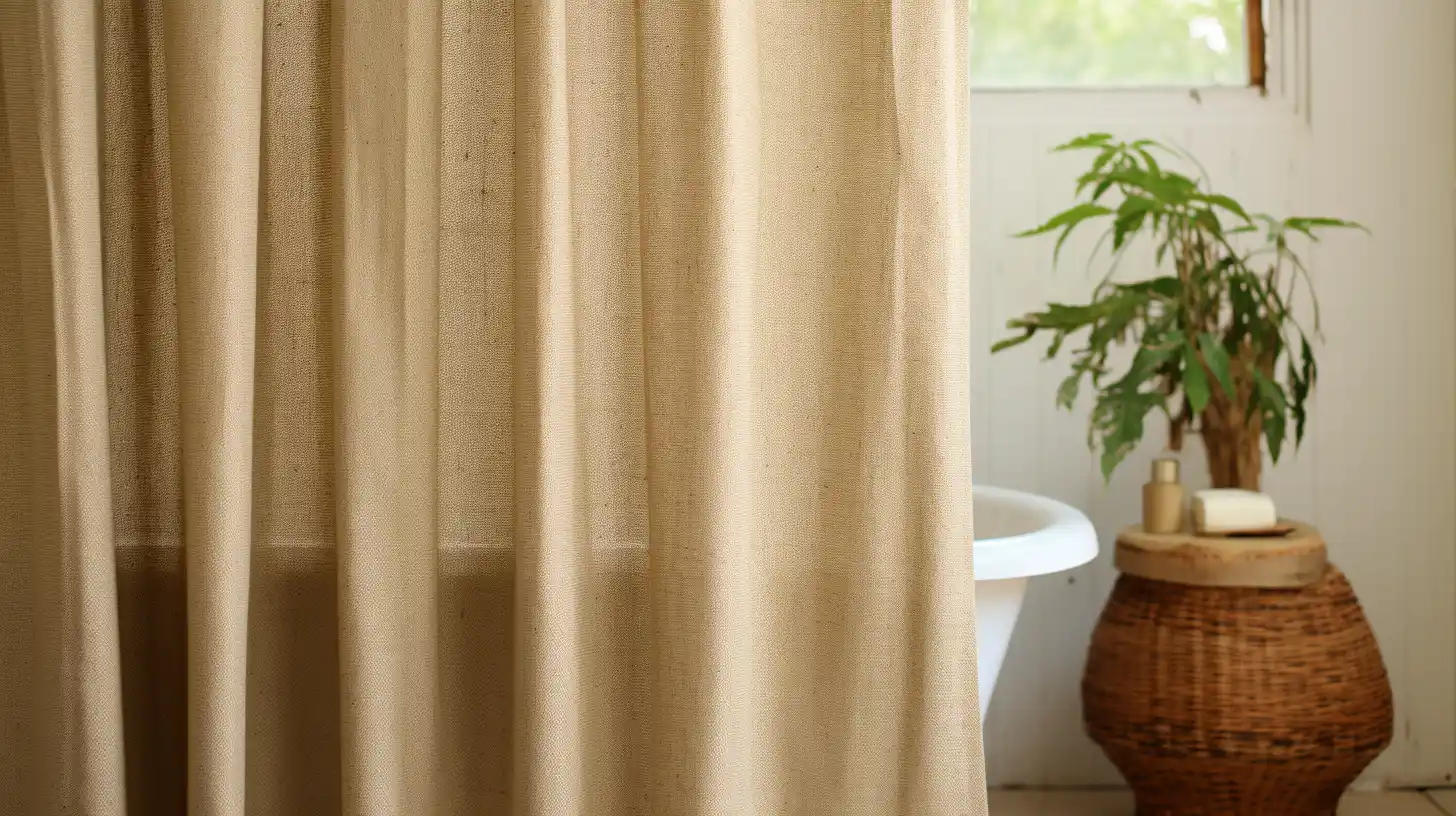
Have you considered a hemp shower curtain as a greener, healthier alternative? Unlike PVC curtains, a hemp shower curtain doesn’t release harmful chemicals.
- Natural Material: Hemp is a sustainable, biodegradable fiber. It doesn’t need the use of toxic chemicals in its production.
- Durability: Hemp fabric is popular for its strength and longevity. This means your curtain will last longer.
- Health-Friendly: By choosing hemp, you significantly reduce your exposure to total VOCs commonly found in PVC shower curtains.
Linen shower curtains
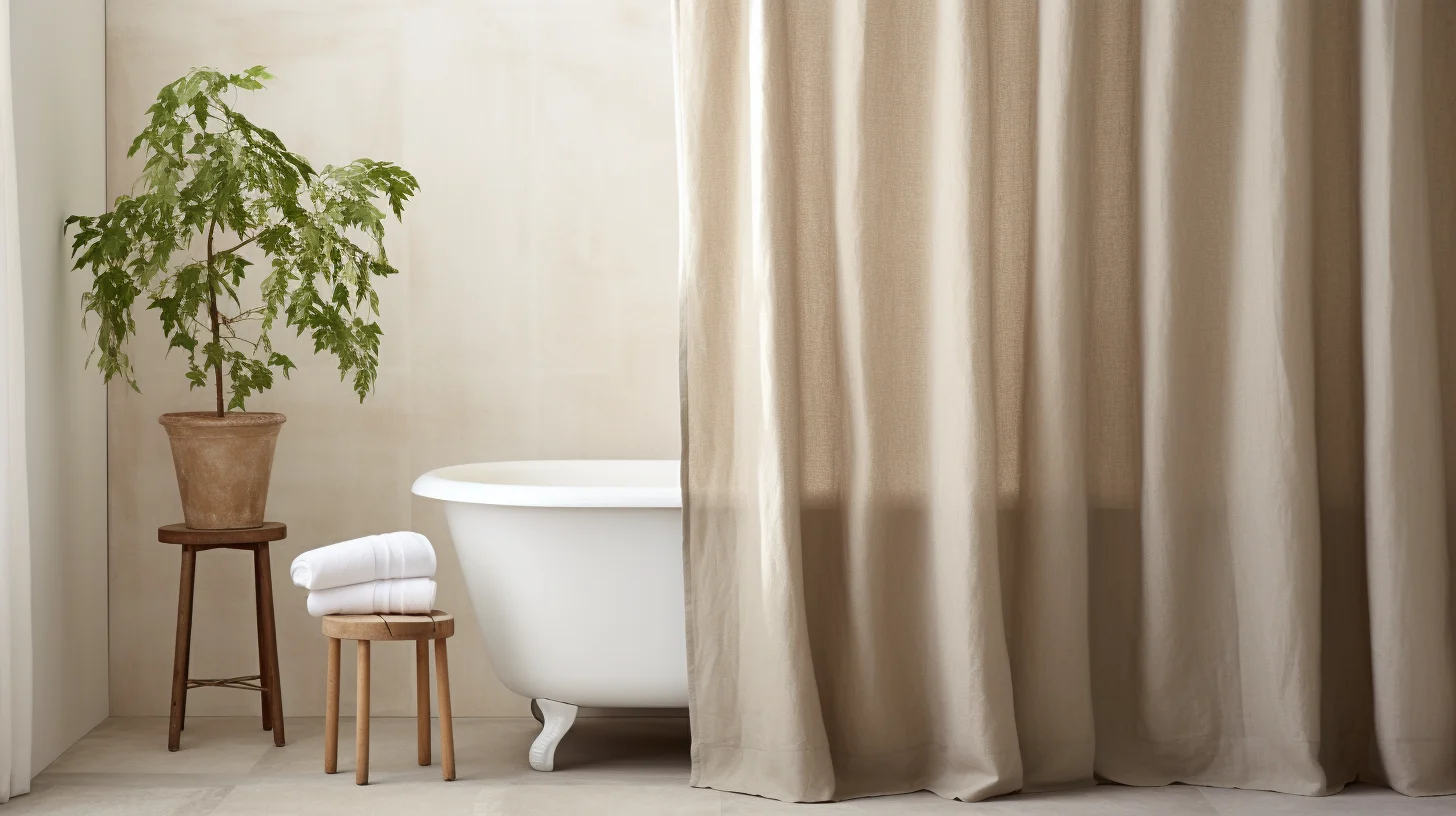
Next, let’s explore the benefits of linen shower curtains. Unlike PVC options, a linen shower curtain is made from natural fibers. This ensures you’re investing in a PVC-free shower experience. They don’t just elevate your decor. They also contribute to a healthier environment inside and out.
We Recommend Polyester Shower Curtains as an Alternative

While PVC shower curtains pose health risks, opting for polyester alternatives can safeguard your well-being without sacrificing style or durability. Polyester, a material known for its resilience, offers you a PVC-free shower experience. It eliminates the shower curtains’ chemical smell. You won’t have to worry about VOCs off-gassing into your bathroom space.
These shower curtains also come in a variety of designs and colors. You’ll find various options that accommodate your personal taste and bathroom decor. Furthermore, polyester shower curtains are famous for their ease of maintenance and longevity. This means you’re investing in a product that won’t need frequent replacement.
Care and Maintenance Tips
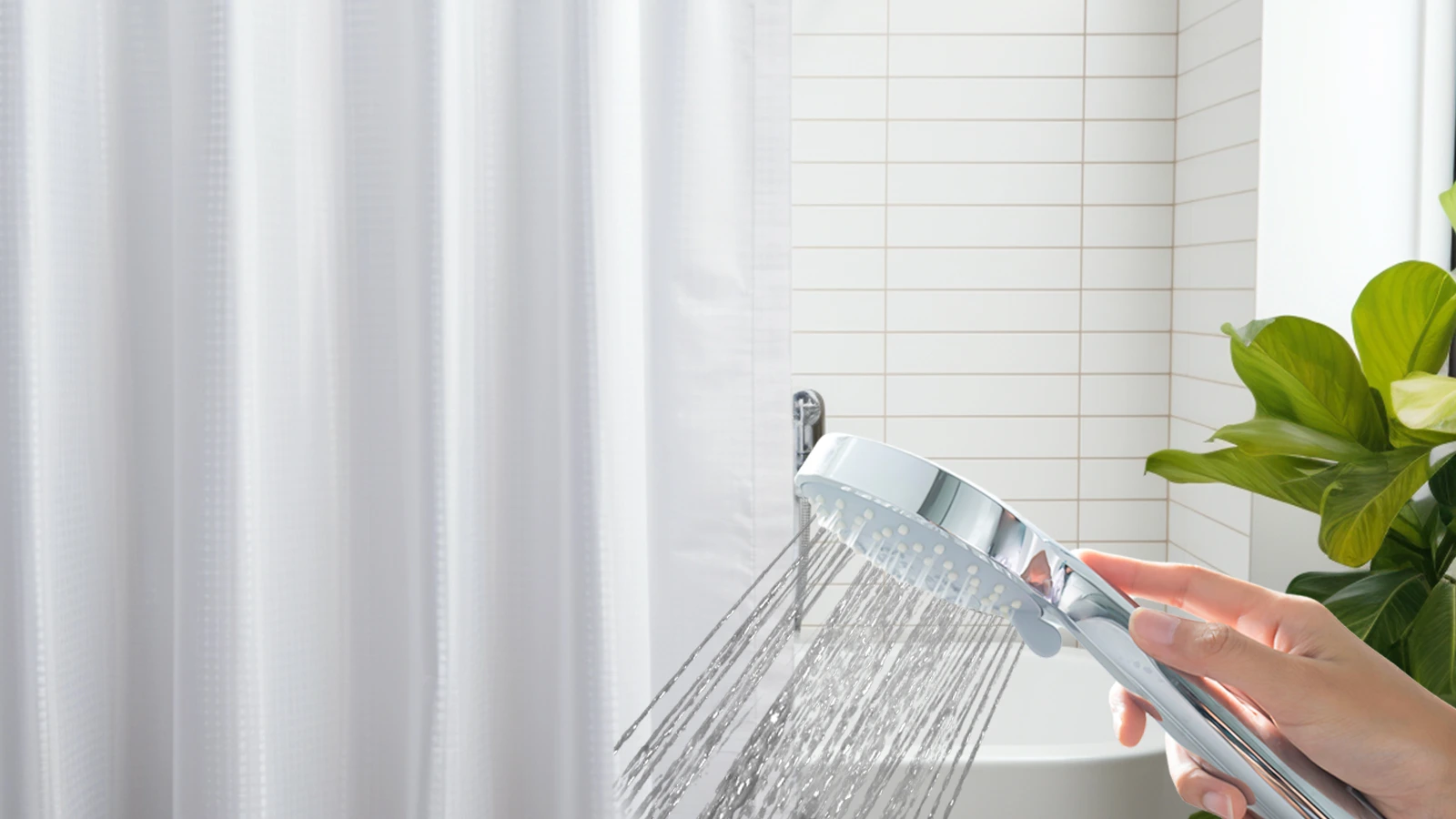
To reduce the potential health risks associated with plastic shower curtains, it’s essential to implement regular care and maintenance routines. By following some straightforward tips, you can lessen your exposure to the harmful chemicals they may release.
First and foremost, always look for PVC-free shower curtains. These are less likely to emit volatile organic compounds and other toxic substances.
Here are a few care and maintenance tips to keep in mind:
- Regular Cleaning: Wash your shower curtain often to prevent mold and mildew buildup.
- Gentle Washing: Use mild detergent and warm water. Steer clear of harsh chemicals that can break down the curtain material.
- Proper Drying: After cleaning, ensure your curtain is thoroughly dried. A well-ventilated area or direct sunlight can be effective.
Conclusion
So, you’ve cozied up to a toxic tango in your tub, cuddling close to that chemical concoction cleverly camouflaged as a curtain.
Perhaps it’s time to ditch the PVC partner and waltz with a safer, snazzier fabric that won’t gas you with a VOC serenade.
Let’s face it, your bathroom boogie deserves better.
Swap out that plastic perpetrator for a polyester pal, and shower in peace, not in poison.
Remember, a clean conscience is just as important as a clean body.
FAQs
Q: What are PVC and vinyl shower curtains?
A: PVC and vinyl shower curtains are made from polyvinyl chloride. It’s a type of plastic material widely used for shower curtains due to its water-resistant properties.
Q: How can I ensure that my shower curtain is safe?
A: Look for shower curtains that are free from potentially toxic substances. Additionally, consider choosing shower curtains labeled “low VOC” or “non-toxic” to reduce exposure to harmful emissions.
Q: What can I do about the strong chemical smell from a new PVC or vinyl shower curtain?
A: To reduce the smell, you can air out the new shower curtain by hanging it outdoors. Or you can hang it in a well-ventilated area for a few days before using it.
Q: What should I do if I already have a PVC or vinyl shower curtain?
A: If you already have a PVC or vinyl shower curtain, you can try to reduce the release of chemicals. You should ensure proper ventilation in the bathroom and periodically clean the curtain.
Q: Can vinyl shower curtains be recycled or disposed of safely?
A: While you cannot recycle some vinyl shower curtains, it’s important to check for specific recycling instructions provided by the manufacturer. If recycling is not an option, proper disposal at a designated facility can help prevent the environmental impact of PVC or vinyl materials.

